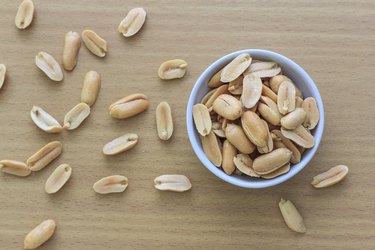
Monkey nuts is a term sometimes used to describe peanuts, which are a high-fat, calorie-dense snack. Although peanuts are high in calories, they can be a good snack choice because peanuts are small, portable and do not require refrigeration. Even if you are dieting, making room for peanuts in your diet can be beneficial because peanuts provide numerous nutritional benefits.
Calories in Monkey Nuts
Video of the Day
Monkey nuts are high in calories, especially if you consume multiple servings. Each 25 g serving of monkey nuts, which is comprised of about 12 nuts, contains 135 calories. This amount of calories is just more than 6 percent of the daily suggested intake of 2,000 calories. If you are dieting, you can burn the calories provided by monkey nuts through a variety of activities. For example, you can burn 135 calories by hiking for 19 minutes or playing volleyball for 28 minutes.
Video of the Day
Fat Content of Monkey Nuts
Monkey nuts are high in fat. Each 12-nut, or 25 g, serving of monkey nuts provides 10.7 g of fat. Of this fat, just 2.1 g comes from saturated fat. Unsaturated fats are healthier than saturated fats, as unsaturated fat may promote improved cholesterol levels, while too much saturated fat may increase your risk of cardiovascular disease.
Carbohydrate Content of Monkey Nuts
Monkey nuts are low in carbohydrates, with 2.7 g of this nutrient. Carbohydrates provide your body with energy, although limiting your carbohydrate intake may be beneficial if you are attempting to lose weight. According to a study published in the April 2003 issue of "The Journal of Clinical Endocrinology and Metabolism," low-carbohydrate diets can be more effective than low-fat diets for weight loss.
Protein Content of Monkey Nuts
Monkey nuts provide a moderate amount of protein. Each 25 g serving, or about 12 nuts, contains 6.3 g of protein, which is about the same amount as an egg provides. Protein provides the amino acids your body needs to make and repair vital tissues, such as skin and bone. Due to the importance of protein, MedlinePlus suggests eating 50 to 65 g of this nutrient daily.
- LIVESTRONG.COM MyPlate: Calories in Unsalted Roasted Monkey Nuts (Tesco)
- Mayo Clinic; Exercise for Weight Loss: Calories Burned in 1 Hour; December 2009
- MedlinePlus Medical Encyclopedia; Dietary Fats Explained; October 2010
- "The Journal of Clinical Endocrinology and Metabolism"; A Randomized Trial Comparing a Very Low Carbohydrate Diet and a Calorie-Restricted Low Fat Diet on Body Weight and Cardiovascular Risk Factors in Healthy Women; B.J. Brehm et al.; April 2003
- LIVESTRONG.COM MyPlate: Calories in Egg
- MedlinePlus; Dietary Proteins; April 2011